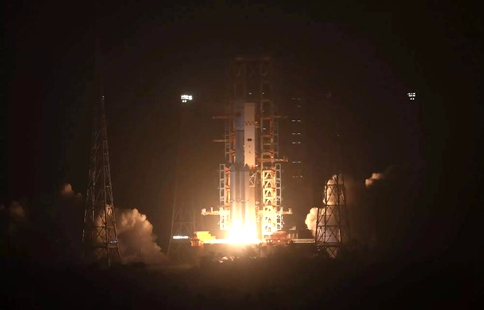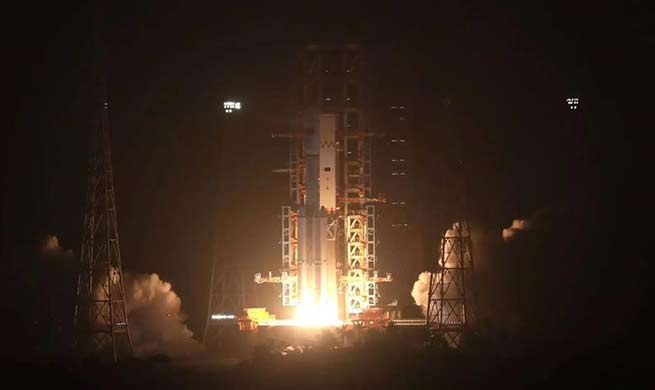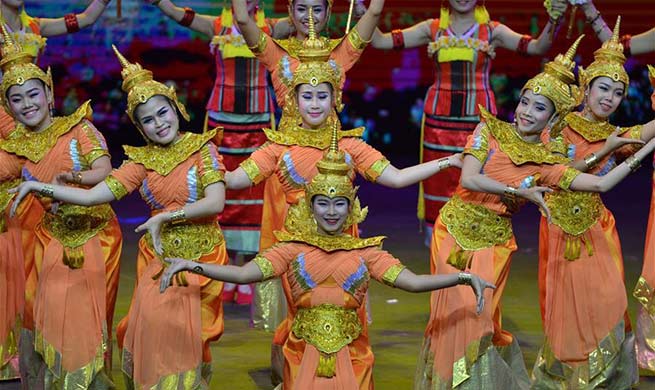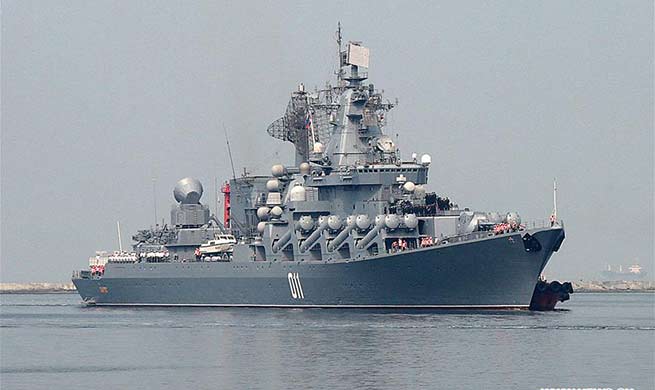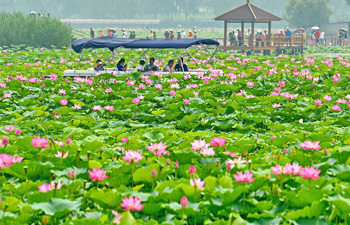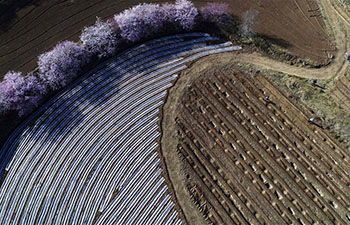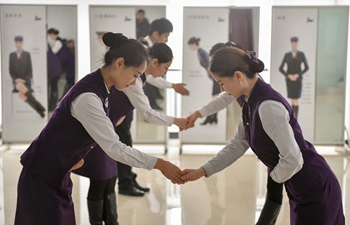TOKYO, April 20 (Xinhua) -- A new economic dialogue setting out parameters to enhance economic ties between Japan and the United States recently while on the one hand purports to chart a rosy bilateral trade understanding between both countries has also underscored some long-standing gulfs in economic objectives.
On Tuesday, visiting U.S. Vice President Mike Pence held talks with Japan's Deputy Prime Minister Taro Aso and launched the U.S.-Japan Economic Dialogue, which will ostensibly act as means to deepen bilateral economic cooperation through an ongoing forum.
The dialogue was agreed to in principle between Japanese Prime Minister Shinzo Abe and U.S. President Donald Trump when the two leaders met in February and spent some highly-publicized "quality time" on the links together at one of Trumps palatial abodes.
The dialogue sets out three policy pillars that will structure further talks to be held in December, but a number of thorny issues were discernibly shelved for the time being, perhaps owing to more pressing geopolitical concerns and the need to show a united front, but, nevertheless, revealing a sizable gulf in each country's economic postures that will be tough to resolve, analysts attest.
"Japan was one of the last countries to join the now defunct Trans-Pacific Partnership (TPP) multilateral free trade agreement and during exhaustive negotiations with the U.S. came to a basic understanding that would allow the pact to go ahead with the 'elimination' of trade tariffs," Hisao Katayama, a senior equity analyst at Nomura Securities Co., told Xinhua.
"Japan was desperate to protect sectors that would have been destroyed if import tariffs were scrapped and this was one of the main reasons the TPP negotiations dragged on for so long, allowing the Trump administration to sweep in and sweep away the pact," Katayama added.
The analyst was referring, essentially, to the Abe administration at the time kowtowing to powerful business lobbies that continue to hold a significant amount of both financial and political clout.
These former negotiations, that saw Japan hugely reluctant to drop its hefty tariffs on automotive imports from the U.S. and, perhaps more-so, vehemently protect its agricultural sector from cheaper international competition, form the backdrop of Japan's future and likely thorny economic ties with the U.S.
With Trump having already taken aim at Japan a number of times since becoming president for Japan's seemingly perpetually weak currency and more recently ardently suggesting that some kind of intervention might take place if the dollar continues to strengthen, the fact that the United States' logged a hefty 68.94-billion- U.S. dollar trade deficit with Japan in 2016 also puts Japan's future trade hand in a fundamentally weaker position.
"Admittedly, on the surface, Japan and the U.S. are exceedingly close friends and allies, as evidenced by Abe rushing to the side of Trump as one of the first leaders to congratulate him after winning the presidential race and prior to that as a 'friendly social call' as it was portrayed," Katayama said.
"But be this as it may, with the TPP deal on the line Abe was looking at the time to curry economic favor in lieu of the pact and was actively promoting Japan Inc. and all the ways Japan had and could support Trump's new 'America First' policy and in doing so hoping to jump to the top of the FTA queue," explained Katayama.
But Pence had clearly been appraised of Japan's inherent inclination to take care of its own and not necessarily work towards win-win deals. Trump would have more than likely seen Japan and Abe's overtures for what they were, with past negotiations not forgotten.
Japan and Washington during the Obama years were at an almost permanent TPP standoff regarding what Japan described as its five "sacred sectors", rice, wheat, beef and pork, dairy products and sugar, and its desire to protect these industries, and the U.S. demanding full access to Japanese markets for its agricultural goods.
Washington had also insisted that Japan eliminate some technical barriers that prevent the sales of some U.S. cars in Japan, while maintaining tariffs on Japanese automobile imports.
Among the 12 countries involved in the TPP free trade talks, Japan and the U.S., the two largest economies involved in the talks at the time, were constantly at loggerheads, as Japan remained ever-reluctant to alleviate tariffs to protect its own interests.
Abe, under immense pressure from farm lobbies, such as the politically powerful Central Union of Agricultural Cooperatives, tried, against the spirit of the pact, to uphold tariffs on its sensitive sectors, which in the case of rice, saw tariffs of more than 700 percent slapped on foreign imports to protect the age-old sector from cheaper overseas competition.
With this fact not lost on the current U.S. administration and its future dealings with Japan, such lobbies here comprise large numbers of powerful, conservative supporters of Abe's ruling Liberal Democratic Party (LDP), with high-ranking politicians and bureaucrats, from whom Abe derives a great deal of political support, quick to offer "enshrined" parliamentary resolutions as a reason negotiations end before they begin.
To this end, informed sources said ahead of Pence's talks with Aso this week, the U.S. side wanted Japan to agree a fixed framework for negotiating a bilateral trade deal that would see Japan swiftly remove its sky-high tariffs and for this to be actuated within a three-month time frame.
True to Japan's strategy of playing the friendship card to win the best hand it can, however, sources close to the matter said Aso's team had wanted to invite Pence for a private slap-up sushi and tempura banquet at Aso's home in Tokyo, but Pence side rejected the offer, presumably opting to keep relations less "chummy" and more businesslike.
"It was apparent that Pence, on behalf of the Trump administration, is gearing up for the U.S. to play hardball with Japan and won't be swayed by 'Abe-like' friendly manipulation," said Katayama, adding that Pence had all but flat-out rejected the notion of inking an FTA in the near future with Japan.
"The TPP is a thing of the past for the United States. The Unites States is determined to reach out to our partners in the world to negotiate trade on a bilateral basis," Pence told a joint press briefing following talks with Aso on Tuesday.
"President Trump believes it is in the interest of the United States to negotiate trade agreements on a bilateral basis...... At some point in the future, maybe, a decision will be made on a U.S.-Japan FTA based on what we learned from the (new) economic dialogue. But, whether Japan and the U.S. will reach an FTA, I will leave that to the future," Pence said.





